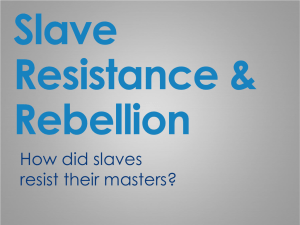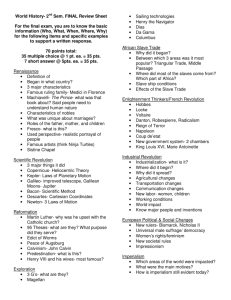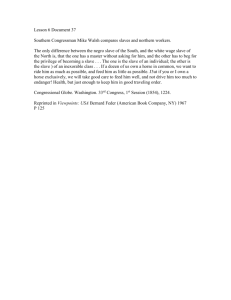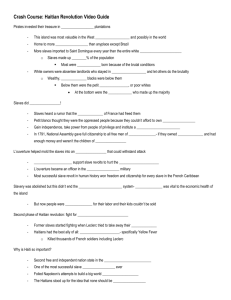Chapter 5 Methods of Controlling Slaves
advertisement
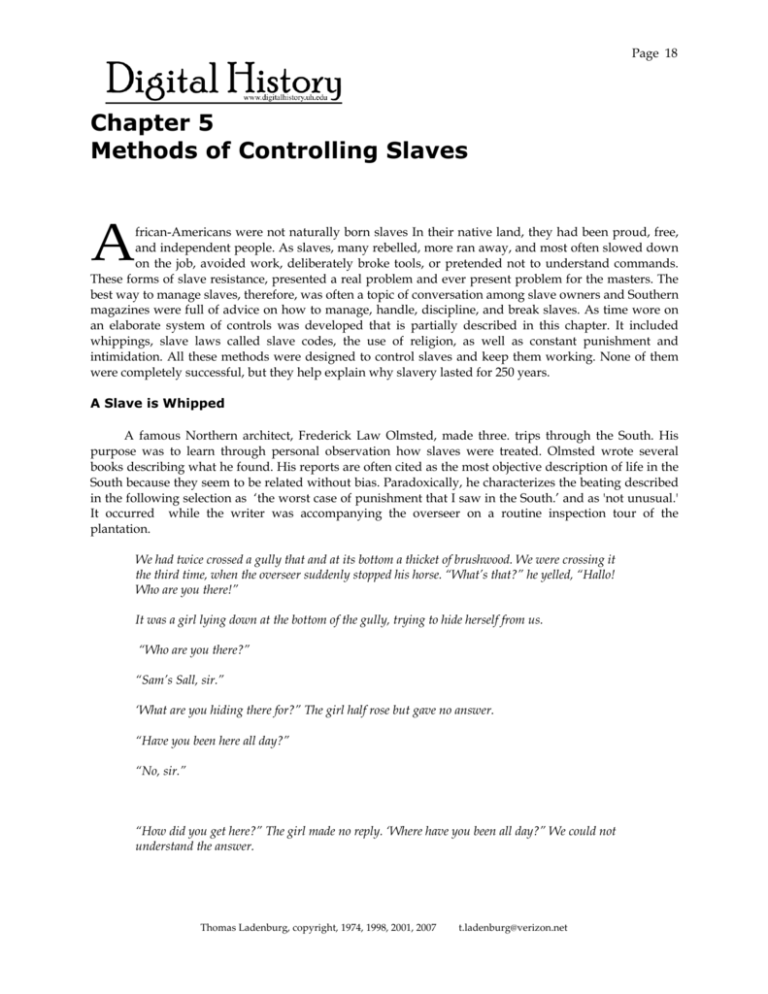
Page 18 Chapter 5 Methods of Controlling Slaves A frican-Americans were not naturally born slaves In their native land, they had been proud, free, and independent people. As slaves, many rebelled, more ran away, and most often slowed down on the job, avoided work, deliberately broke tools, or pretended not to understand commands. These forms of slave resistance, presented a real problem and ever present problem for the masters. The best way to manage slaves, therefore, was often a topic of conversation among slave owners and Southern magazines were full of advice on how to manage, handle, discipline, and break slaves. As time wore on an elaborate system of controls was developed that is partially described in this chapter. It included whippings, slave laws called slave codes, the use of religion, as well as constant punishment and intimidation. All these methods were designed to control slaves and keep them working. None of them were completely successful, but they help explain why slavery lasted for 250 years. A Slave is Whipped A famous Northern architect, Frederick Law Olmsted, made three. trips through the South. His purpose was to learn through personal observation how slaves were treated. Olmsted wrote several books describing what he found. His reports are often cited as the most objective description of life in the South because they seem to be related without bias. Paradoxically, he characterizes the beating described in the following selection as ‘the worst case of punishment that I saw in the South.’ and as 'not unusual.' It occurred while the writer was accompanying the overseer on a routine inspection tour of the plantation. We had twice crossed a gully that and at its bottom a thicket of brushwood. We were crossing it the third time, when the overseer suddenly stopped his horse. “What’s that?” he yelled, “Hallo! Who are you there!” It was a girl lying down at the bottom of the gully, trying to hide herself from us. “Who are you there?” “Sam’s Sall, sir.” ‘What are you hiding there for?” The girl half rose but gave no answer. “Have you been here all day?” “No, sir.” “How did you get here?” The girl made no reply. ‘Where have you been all day?” We could not understand the answer. Thomas Ladenburg, copyright, 1974, 1998, 2001, 2007 t.ladenburg@verizon.net Page 19 After some more questions. she said that her father had locked her up by accident and then went out in the morning. ‘How did you manage to get out.?” ‘Pushed a plank out, sir, and crawled out.” The overseer looked at the girl and then said, “That won’t do, come out here.” The girl arose at once, and walked towards him. She was about eighteen years of age. A bunch of keys hung form her waist. He saw them and said, “Ah, your father locked you in, but you have the keys.” After a moment of thought she said that these were the keys of some other locks. Her father had the door key. The overseer might have found out if her story was true or false in two minutes. He could have gone off to talk to the girl’s father who was working in the next field. But the overseer had already made up his mind that the girl was lying. “That won t do,” he said, “get down on your knees.” The girl knelt on the ground. He got off of his horse and struck her thirty or forty blows across the shoulders with his whip. At every stroke the girl winced and yelled, “Yes, sir” or “Ah, Sir!" or “Please, sir” but did not groan or scream. Finally he stopped and said, “now tell me the truth.” The girl repeated the same story. “You have not got enough yet,” he said. “Pull up your clothes -— lie down.” The girl drew her dress under her shoulders and lay down on the grass with her face toward the overseer. He continued to hit her with the raw—hide whip. across her naked thighs. with as much strength as before. She now shrunk away from him. screaming, “Oh, don’t sir!" "oh please stop, master, please, sir", "oh, God, master. Do stop!, oh, God, Master" I glanced again at the overseer. His face was grim and business like. He did not seem angry or excited. “Was it necessary to punish her so severely?” “Oh yes, sir.” he said, laughing. “If I hadn’t punished her so hard. she would have done the same thing tomorrow. The next day half the people on the plantation would have followed her example. Oh, you have no idea how lazy these blacks are. You northern people don’t know anything about it. They would never work at all if they were not afraid of being whipped.” 20 Slave Codes Slave codes were rules made for slaves which were the law of the state. Every Southern state had a set of slaves codes. Often one state would copy the laws passed by another, so the slave codes were usually quite similar all over the South. The following is quoted from the Louisiana Slave Code of 1852: I. The slave owes to his master and all his family total respect and absolute obedience. He must instantly obey all orders he receives from them. 2. No slave can own anything of his own without the consent of his master. No slave can sell anything he has made without his master’s consent. 20 Frederick Law Olmsted, A Journey in the Back Country, New York, 1860, pp. 83-84. Thomas Ladenburg, copyright, 1974, 1998, 2001, 2007 t.ladenburg@verizon.net Page 20 3. No slave can be a witness in any case against a white person. 14. Slaves shall always be considered real estate, and may be mortgage according to the rules of law. l9.No slave shall be allowed off of his plantation without written permission from his master. 29. If a slave willfully strikes a white person to cause shedding of blood, the slave shall be punished with death. 149. Any person who teaches a slave to read and write shall be imprisoned for no less than one month or more than 12 months. 21 A Sermon Preached to Slaves The following sermon was preached to slaves by a minister of God. It was considered so good that it was printed in a magazine to give other masters ideas of the kind of religion slaves should get. I have just shown you the chief duties you owe to your great master in heaven. I will now tell you your duties to your masters and mistresses here upon earth. You must have one rule that you must always have in your minds that is - serve your master as if he were GOD himself. Poor creatures! You don’t consider that when you are idle and neglect your master’s business, and whatever faults you are guilty of - these are faults against God himself. If you steal from your master, you are stealing from God himself. If you tell lies to your master, you are telling lies to God himself. When you steal and waste your masters goods, when you are saucy and wise, when you are stubborn or sullen, you are sinning not only against your master, but also against your master in Heaven. From this rule - that all ye do unto your master ye do unto GOD himself, there are several other rules which I will, teach you I. You are to be obedient to your master in all things. 2. You are not to be eye—servants. Eye-servants are those who will work hard and seem busy when they think they are being watched. When their master's ‘back is turned, they are idle and don’t do their work. 3. You are to be faithful and honest to your masters - not wasting their goods - but showing all good in all things. 4. You are to serve your masters with cheerfulness, reverence and humility. You are to do your masters service with good will. You should serve him as you would God, from the heart, without any sauciness or answering back. 22 Frederick Douglass and Master Hopkins 21 Gilbert Osofsky, The Burden of Race, New York, Harper and Row, 1967, pp. 15-17. 22 Gilbert Osofsky, op. cit., pp. 39-40. Thomas Ladenburg, copyright, 1974, 1998, 2001, 2007 t.ladenburg@verizon.net Page 21 Frederick Douglass tells how his master controlled his slaves: Mr. Hopkins could always find some excuse for whipping a slave. A mere look, word, or motion — a mistake, or accident —are all, things for which a slave could be whipped. Does a slave look unhappy? It is said that he has the devil in him, and it must be whipped out. Does he speak loudly when spoken to by his master? Then he is getting high-minded. and should be taken down a peg. Does he forget to pull off his hat in the presence of a white person? Then the lacks respect. and should be whipped for it. Does he ever dare find excuses when told he did something wrong? Then he is guilty of impudence - one of the greatest crimes of which a slave can be guilty. Does he ever dare to suggest a different way of doing things from that pointed out by his master? Then he is indeed getting above himself: and nothing less than a flogging will do for him. Does he. while ploughing, break a plow - or, while hoeing. break a hoe? It is owing to carelessness, and for it a slave must always be whipped. 23 Suggested Student Exercises: 1. Do you think the overseer in the story, ‘A Slave is Whipped”, “had” to beat the girl? If he had to beat her, what does this tell us about slavery? 2. List four different slave codes and explain the reason Southerners might have thought them necessary. 3. Explain two different ways that masters tried to “brainwash’ slaves. 4. What do the ways used to control salves tell us about slavery as an institution? 23 Frederick Douglass, Narrative of the Life of Frederick Douglass, Boston, 1845, pp. 111-12 Thomas Ladenburg, copyright, 1974, 1998, 2001, 2007 t.ladenburg@verizon.net



